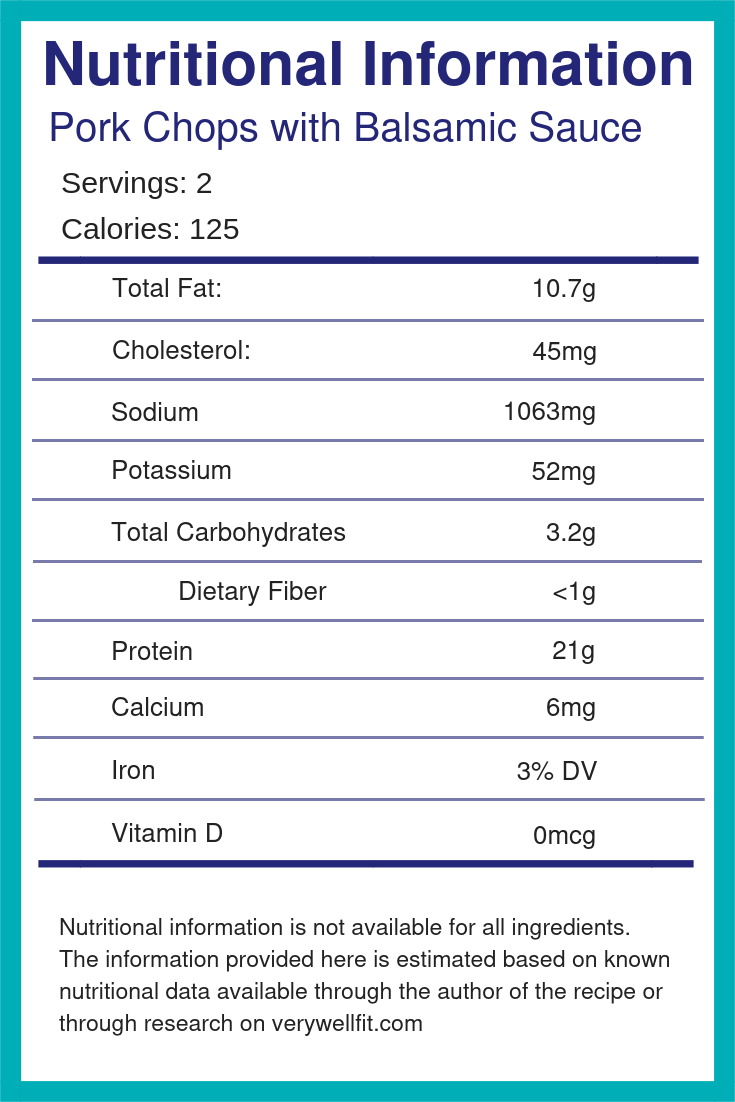
These savory pork chops pair perfectly with a cookout. Try this low-carb recipe this week!
Meats tend to be popular among people trying to manage weight or blood sugar because they are very low-carb foods. They are also high in protein which is an essential nutrient and a great fuel source for our bodies! Meat seems to be most popular during holiday cookouts and summer gatherings.
If you're a meat-eater who's looking for something new to try this week, here's a perfect recipe to start with!
Ingredients
- 2 tablespoons balsamic vinegar
- 2 tablespoons reduced-sodium soy sauce
- 1 teaspoon Dijon mustard
- 2 teaspoons Truvia (or preferred sugar substitute)
- 1/4 teaspoon red pepper flakes
- 2 boneless 8oz. pork chops
- Salt and Pepper
Directions
- Combine vinegar, soy sauce, mustard, sugar, and red pepper flakes in a bowl and stir until blended well. Set aside 1 tablespoon of the marinade and refrigerate.
- Place raw pork chops in a resealable bag. Pour the bowl of marinade into the bag with the pork. Seal the bag and turn to coat the pork. Refrigerate in the bag for 2 hours, or up to 24 hours.
- Spray your grill pan with nonstick cooking spray and heat over medium-high.
- Remove pork from the bag and discard leftover marinade. Cook the pork chops for 4 minutes on each side. The meat should be just slightly pink in the center. Cook an additional minute on each side if needed.
- Place pork chops on plates and top with reserved 1 tablespoon marinade. Salt and pepper to taste.
Serve with fresh grilled veggies to keep with a low-carb meal, or with potatoes or corn to add some healthy carbs. Looking for new ideas for sides? Search the Diathrive recipes. We have delicious options for tried-and-true favorites, as well as items that may be entirely new to you. Enjoy!

Why Low-carb?
There's no "one way" to eat if you have diabetes. We encourage individualized eating that matches your personal health goals and needs. But, when it comes to blood sugar management, low-carb can be a very good option.
Your body breaks down carbohydrates into glucose (sugar), and managing blood sugar is important when you live with diabetes. Because carbohydrates increase blood sugar levels, reducing carbohydrates helps keep blood sugar levels lower. There are lots of low-carbohydrate options available for your favorite dishes, which makes it easier to manage your glucose levels while eating the foods you love.
Not looking to go full low-carb diet? Consider pairing this recipe with some carbohydrate sides for a moderate-carb meal.
Why Reduced-sodium Soy Sauce?
Sodium is just another word for salt, and we know too much salt can increase blood pressure. People living with diabetes are twice as likely to have high blood pressure, so managing your salt intake is an important part of diabetes care.
Is salt really that important?
In moderation, salt is not a problem, but most people already eat between 6 and 18 grams of salt a day. Compare that to the recommended amount of salt and it is easy to see where salt intake can be too high. The Centers for Disease Control and Prevention recommends 3.4 grams of salt a day, and the American Heart Association recommends about 1.5 grams a day.
Why Lean Cuts of Pork?
People living with diabetes should be mindful of unhealthy fats. Eating a diet high in unhealthy fats, including high levels of saturated fat, is associated with an increase in LDL cholesterol (that's the "bad" cholesterol you've likely heard of) which leads to heart disease, one of the most common issues that lead to death among people with diabetes. The dilemma is easily curbed by either choosing a leaner cut or trimming the fat from a more fatty cut of meat. Because cardiovascular disease is one of the leading complications of diabetes, choosing lean cuts of meat not only help manage blood sugar, but also help keep your heart healthy.
Pork is sometimes viewed as unhealthy because it can be high in fat (think bacon), but pork is a good source of high-quality protein and is packed with nutrients including niacin, Vitamins B6 and B12, iron, and zinc.
- Niacin is actually another name for Vitamin B3 and it helps your body turn food into energy, keeps your nervous and digestive systems healthy, and keeps your skin healthy.
- Vitamin B6 also is important in keeping your nervous and immune systems healthy.
- Vitamin B12 keeps your body’s blood and nervous system healthy. (See a theme here?)
- Iron, also found in pork, is essential to blood production, with about 70 percent of your body’s iron found in red blood cells. Your body uses iron to make hemoglobin (think A1c), the protein in red blood cells that carries oxygen from your lungs to all the parts of the body.
- Lastly, zinc is an essential element that helps your immune system and metabolism function properly.
Should you eat pork every day? Probably not, but that would be boring anyway. Just remember — all things in moderation!
